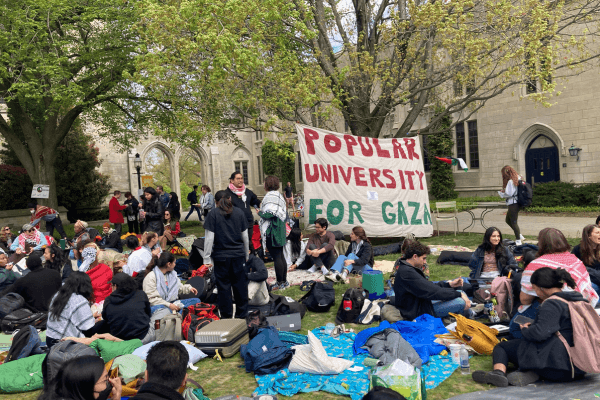Kathryn Gin Lum’s Heathen: Religion and Race in American History evoked feelings of a past that continues to haunt me. I grew up in the “mission field” of the southern Philippines, surrounded by white Americans who dedicated their lives to missions and charity work.
When Super Typhoon Haiyan ravaged our villages and cities in 2013 and took the lives of over 6,000 Filipinos, I remember when American missionaries arrived to help us. They watched the violent results of climate change in the Philippines as dead bodies, demolished homes, and damaged landscapes surrounded them. They said they were “sorry” for all the death and destruction that the “bad weather” caused while completely disregarding the correlation between the climate crisis and imperialism. At that moment, I witnessed the tragic history Lum describes in her work and how it continues to hurt many Indigenous communities today.
Heathen exposes how contemporary missionaries and missiologists colonized lands and designated Indigenous people as “heathens” in order to justify their conquest. Though the term heathen may have fallen out of common usage in the early 1900s, Lum argues that the idea continues to exist today.
Lum writes from an Asian American perspective. Now a historian of religion and race at Stanford University, she grew up in a predominantly white church, where she first experienced the machinations of American Christian exceptionalism. There, she witnessed the segregation of races into the binary of “us” and “them” — an othering based on race and class. Through the process of conversion, Lum argues that non-white converts are forced to both abandon and despise their ancestry, family ties, and cultural backgrounds. She writes, “… some converts even used the language of heathenism to refer to their former selves and their unconverted family and friends.”
In current times, the idea of the heathen underpins “a White American Christian superiority complex.” Lum explores this through the white savior trope, pointing to the historical example of how many white Americans positioned themselves “in opposition to the heathen world… [in order] to give themselves a venue for the evangelizing work that marked them as the givers [rather] than recipients of aid.” Within the context of the United States, “heathen” has become a racial and classist designation meant to distinguish between the so-called “first world” and the “third world.”
Lum describes the U.S. as an imperial enterprise that married historic Christian traditions with colonial processes. According to Lum, this resulted in what we now know today as American exceptionalism. Classifying people as “heathens,” became a “reason and justification for a range of actions that have stemmed from Americans’ conviction that other people need to be transformed.” This transformation applies to both people and land.
Lum highlights one specific example that might surprise Christian social justice advocates: the way evangelical leader Ronald J. Sider segregated the world into “rich Christians” and billions of “hungry neighbors” who live in countries ravaged by poverty, illiteracy, and disease. Imagining the so-called “third world” and its inhabitants in this way echoes the archaic concept of the heathen. Lum writes that Sider “links technological development (or apparent lack thereof) to religious orientation,” namely that some countries were less developed due to their non-Christian beliefs. In this way, wealthy Americans saw themselves as the saviors of the hungry world, which was accomplished by contrasting the “maturity” of American Christian life against the “backwardness” of Indigenous religions, landscapes, and peoples.
Lum believes these racist ideas can be traced back to the heathen myth. Missionaries used Christian philanthropy to segregate Indigenous lands and secure a class hierarchy in which white Americans were on top and non-white, Indigenous peoples were on the bottom. This hierarchy is dependent on the imagination of the heathen world as uncivilized and backward. In order for the land and its people to meet their full maturation, white Christian missionaries must lead the way.
I am reminded of theologian Willie James Jennings’ warning in The Christian Imagination that this colonial enterprise acts as a universal racial scale meant to displace Indigenous peoples from their homes, enslave their bodies, and extract materials from their lands for capitalist gain. Likewise, Lum argues, “Understanding the heathen as the inheritance of Christ, and their lands as His rightful possession, rendered the entire heathen world ripe for the taking of Christ’s representatives on earth.” Indeed, the philanthropic move to “exercise and exorcise” the wealth of rich Christians became the driving force behind many religious attempts to Christianize and Americanize the “heathen,” those whose lands carried the potential for economic, industrial, and social progress. Engaging with the work of postcolonial theorist Aimé Césaire, Lum argues, “Colonization was about stretching the reach of capitalism across the globe.”
Today, colonial exploitation continues by way of imperial operations and Christian missions. Whether it’s because of culture, language, religious experiences, or skin color, Indigenous communities across the world are deemed “heathen” by imperialists to justify the commodification of land and forced servitude.
For instance, the Mapuche people in Chile have been protesting to regain their territories against a state established by Spanish colonizers, U.S. imperialists, and fascist dictators. On September 4, their petition to govern their own Indigenous homes was voted down, leaving the Mapuches to cope with a system that continues to fail them.
While the impacts of colonization are still being felt today, Lum remembers the legacy of activists like Chinese immigrant Wong Chin Foo, who embraced his “heathenness” as protest. For instance, when Wong published an article titled “Why Am I a Heathen?,” he argued that the true heathens were the white racists who excluded Chinese workers through the 1882 Chinese Exclusion Act. Wong embraced his “heathenness,” arguing that the Chinese have done nothing to deserve exclusion but have been treated unjustly by hypocritical white Christians. Thus, he protests, “This is what keeps me the heathen I am!”
Activists like Wong understood the racial substance of terms like “heathen” and “pagan” — terms that segregated him and other immigrants from public life in the United States. Wong sought to resist racist systems by defiantly claiming the word for himself. In this way, colonized people resist the classist-segregationist project of American Christian exceptionalism.
After reading Heathen, I’m convinced that the project of American Christian exceptionalism is in direct contradiction with Jesus’ ministry. The historical Jesus was a Palestinian Jew who hailed from the poverty-stricken town of Nazareth. Though he was called the “king of the Jews,” Jesus did not claim imperial power for himself but was publicly executed by the state. Unlike the power-hungry imperialists of our world today, Jesus participated in the suffering of the oppressed. Jesus preached, “The Spirit of the Lord is on me, because he has anointed me to proclaim good news to the poor. He has sent me to proclaim freedom for the prisoners and recovery of sight for the blind, to set the oppressed free” (Luke 4:18 NIV).
Heathen presents the reality of the world we are living in today and the stories that formed it. With Lum, I lament imperialism and the fact that it is inextricably tied to the modern story of othering Indigenous lands and peoples for the sake of imperial gain. However, my hope lies in Black, brown, Asian, and Indigenous Christians across the world who are following the words of Jesus in Luke 4:18 and pursuing the justice of God, working to build a more just world. Indeed, I am eager to discover how the future of Christianity unfolds, and I pray that it finally destroys the bonds of imperialism once and for all.
Got something to say about what you're reading? We value your feedback!







